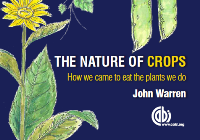Aberystwyth, United Kingdom
April 8, 2015

The avocado undergoes a sex change overnight, and orchids are the kinky perverts of the plant world, but although there are 20,000 varieties of orchid we only eat one – the vanilla pod!
These are just some of the fascinating facts unearthed in Professor John Warren’s new book The Nature of Crops – How we came to eat the plants we do, to be published by CABI on April 24th.
Professor Warren is the Director of Learning and Teaching at Aberystwyth University’s IBERS (Institute of Biological Environmental and Rural Sciences) and formerly worked as a cocoa breeder working on the world chocolate bank at the University of the West Indies in Trinidad. He has an academic interest in the sex-life of plants and a recreational interest in all things edible.
Professor Warren said: “Wheat, rice, potatoes and cassava are all crops that were domesticated a long time ago. I strongly believe that we should still be domesticating new crops as we do in IBERS if we want to make the world a better place. Until recently ryegrass was not domesticated - over the last 100 years or so plant breeders in Aberystwyth have turned it into a crop and possibly the commonest plant species on Earth.
The book explores the reasons why we only eat a tiny 1% of the 40,000 plants available whilst the potential is far greater. Most of the crops we eat have fairly dull sex lives, but that can be really good news as these are easier to cultivate and develop outside their home range.”
The book takes the reader on a journey through our history with crop plants. Arranged into recurrent themes in plant domestication, it documents the history and biology of over 50 crops, including cereals, spices, legumes, fruit and cash crops such as chocolate, tobacco and rubber.
Botanist Professor Warren outlines the stories of the plants we eat and the book also features his own illustrations.
“Across many centuries we have selected and domesticated plants for food, often when, in their native form, they are poisonous. For example, wild almonds contain deadly cyanide, and only through trial and error by our ancestors were we able to select and cultivate a non-poisonous almond.
He added: “This book is dedicated to all the teachers and the plant breeders of the world, who between them feed our minds and bellies. Both these professions are frequently misunderstood and underappreciated. In reality they are overwhelmingly motivated by the altruistic desire to make the world a better place.”
IBERS
The Institute of Biological, Environmental and Rural Sciences (IBERS) is an internationally recognised research and teaching centre providing a unique base for research in response to global challenges such as food security, bioenergy and sustainability, and the impacts of climate change. IBERS scientists conduct basic, strategic and applied research from genes and molecules to organisms and the environment.
IBERS receives strategic research funding of £10.5m from the BBSRC to support long term mission driven research, and is a member of the National Institutes of Bioscience. IBERS also benefits from financial support from the Welsh Government, DEFRA and the European Union.